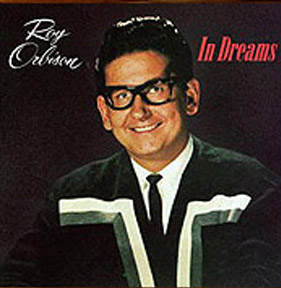24 May 1963

If you had the UK version of the TCM Movies channel on your tellybox, you may remember their weekday-western trailer which included that unlikely gun-slingin’ leading man Roy Orbison toting a guitar that also fires rifle-shot. And even so, the weirdest thing about that clip from 1967 musical comedy western The Fastest Guitar Alive is seeing Roy Orbison bare-eyed, as it were, without his trademark shades. Even wearing clear-lens glasses as in the single sleeve above and video thumbnail below, he looks a different person. In fact, 1963 is the year he changes from glasses to shades, having left his spectacles behind while touring the UK with The Beatles. Maybe he was self-conscious about his eyes, in which case I haven’t helped. Your eyes look fine, by the way.
I always figured his dark glasses were integral to the Roy Orbison mystique: not necessarily an air of unknowable mystery, but a tremulous heartache causing him to well up with tears that must remain hidden from a cruel world. Prime Orbison is magical stuff – even the upcoming ‘Oh, Pretty Woman’, with its playful growl and sassy “Mercy!”, feels like it’s built on a foundation of despair beside a trail of heartbreak. His nearest counterparts on our side of the Atlantic may be Jacques Brel and even Edith Piaf, those two geniuses of the desolated-but-defiant cabaret torch-song.
‘In Dreams’, an Orbison composition, starts off unpromisingly with its ’40s-bobbysox line about “the candy-coloured clown they call the Sandman”. Pretty soon, though, it unfurls into a suite of movements—I count seven distinct segments—that add subtle depth and richness to a three-minute country-pop ballad. I mentioned Brel and Piaf because ‘In Dreams’ has a hint of European sophistication to its strings and its world-weary air: those romantic dreams are blissful but also troublesome for poor ol’ Roy. Bad luck for him; good luck for us, since his woe-begotten croon is electrifying and sumptuous.
In ’60s career terms, Roy wouldn’t be needing those shades much longer. After his annus mirabilis of 1964, including two further Irish number ones, the decade’s cultural upheaval will soon leave Orbison out in the cold until a star-studded late-’80s revival, with perhaps only Scott Walker vocally, or Burt Bacharach and Jimmy Webb musically, carrying his torch in the meantime. (Orbison and the Walker Brothers toured the UK together in 1966.) But at least he got his well-deserved reappraisal during his lifetime. Not everything non-rock, -pop or -soul from the ’60s is a relic for the dumpster – except perhaps that guitar rifle.

